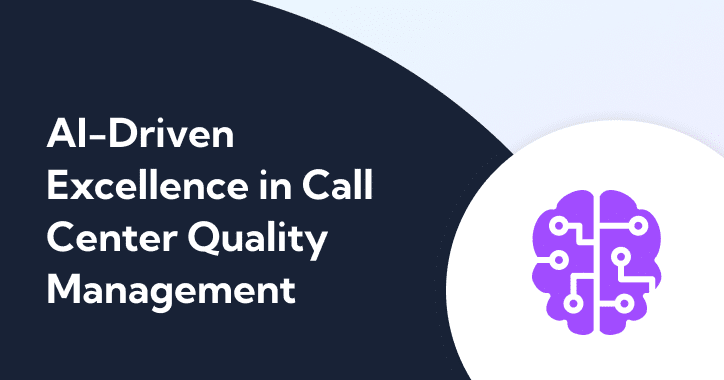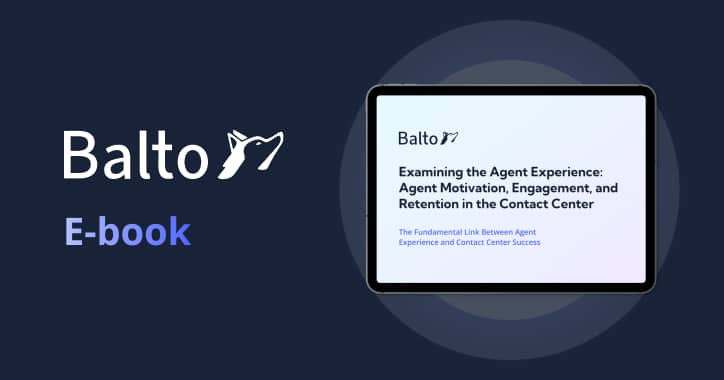
Blair Pleasant
President & Principal Analyst, COMMfusion LLC
Contact centers have been around since the 1960s, and while much of the technology has changed, much has remained the same.
For decades, agents would read from a set-in-stone script, like what you’d find in a Frequently Asked Questions section of a website. Agents were unable to veer from the script. If something came up that wasn’t on the list, callers were on hold for ages waiting for a supervisor. Oversight was more complicated, and companies didn’t want free-wheeling responses that might not be in the organization’s best interest. Therefore, front-line employees were essentially like robots, giving the same answers, leaving their individual skillsets by the wayside.
That original business model is still used today by some organizations. When agents are restricted from taking the initiative and using their problem-solving skills, interactions are stilted and aren’t always helpful for the customer — and are frustrating to the agent.
Agents want to do a good job and solve customers’ issues. That capability is an integral part of job satisfaction and is directly tied to fewer staff resignations. Without some creative freedom, employee engagement can take a downward spiral. So, it’s no wonder that when jobs are plentiful, and agents have choices, contact centers experience as much as a 100% annual turnover rate.
A Technology-Based Approach Advances the Role of the Agent
However, in the past few years, savvy administrators have embraced a fresh technology-based approach to positively transform the contact center experience for customers and agents.
With the power of AI, contact centers can add flexibility and personality, converting robotic-sounding agents following a single script into high-performing, empowered, and engaged representatives.
Taking that one step has led to greater consumer satisfaction and elevated the contact center agent experience from undervalued to highly respected.
AI Presence Behind the Scenes
The benefits of artificial intelligence for the customer are relatively straightforward (more thorough answers, reduced hold times, etc.). But, it might not be as apparent how AI can positively influence the agent experience. With AI-powered platforms and AI-enabled tools to assist, guide, and coach agents in real time, agents are better able to resolve customer issues on the spot, reducing customer — and agent — frustration.
Surprising Results
You might think the use of AI would lead to even more of those robotic responses and strict guidelines of the call centers of the past, but it’s actually the opposite.
AI-driven guidance systems don’t mandate a script but, instead, pull from several scripts. This results in fewer agent mistakes, higher closing rates, less frustration, and a more enjoyable work environment.
For example, Balto’s AI-powered service, Real-Time Guidance, acts as an ever-present coach for agents, providing a vast knowledge base and support for when a conversation takes an unexpected turn. Real-Time Guidance has checklists, dynamic prompts, and even shoots off fireworks for the agents at the end of successful calls. Agents don’t have to spend time searching for the right information or figuring out what to say next.
When agents can resolve a customer issue, complete a sale, and reach the desired outcome, they feel better about their jobs and are more likely to stay with the company. This reduces turnover, saving organizations time and money.
Empowering Agents in the Contact Center
While there might be some initial apprehension, agents ultimately perceive the AI tools as pseudo-assistants rather than an oversight mechanism. With access to libraries of information and dynamic prompts, agents have access to answers at their fingertips and can get their call back on track when thrown a curveball.
As agents can be encouraged to make more decisions based on immediately available accurate data and information, call escalations and the need for assistance from supervisors diminish, along with the risk of mistakes. Agents in remote or hybrid environments can get the information they need without relying on the presence of supervisors, enabling them to provide the same level of service and support regardless of location.
AI-Driven Tools Positively Impacting the Agent Experience
The proven effectiveness of artificial intelligence for contact centers has opened a new market, and businesses now have choices in the AI tools they adopt. While there are various tools for assisting customers, such as conversational AI and chatbots, several services are most useful for assisting agents.
- Script Development and Collaborative Intelligence Tools – advanced AI training that continuously improves with agent input
- Active Listening Prompts – ensuring that agents gather accurate and pertinent details before responding
- Predictive Behavioral Routing (PBR) – routing calls to the ideal agents based on the specific inquiry
- Agent Assistance – keyword triggers that provide information helpful to the conversation, such as knowledge-base articles or promotions
- Real-Time Guidance – smart checklists with real-time call flow reminders to keep the conversation on track and dynamic prompts that guide agents through make-or-break moments
- Virtual Support – ever-present training, coaching, and motivation, with an entire library of instantly accessible information
- Post-call Analysis – insights aggregated from large sets of call data to optimize future calls
- Gamification – appreciation and recognition that personalizes the agent experience
In combination, these tools not only streamline operations but elevate the position of today’s agents. Adding gamification to the mix provides a built-in recognition system that gives everyone a pat on the back they deserve.
Benefits to the New Agent Experience
With today’s tools, agents can receive AI-driven in-call guidance, correcting their course as they go. Agents become trusted, valuable team members instead of worker drones who are micromanaged and easily replaceable.
AI-powered real-time guidance platforms provide a range of benefits to agents, including:
- Personality-Driven Interactions – highlighting soft skills like empathy, proactivity, and active listening
- Less Memorization – decreasing or eliminating mistakes and reducing agent stress
- Empowerment – fewer escalations and more real-time assistance
- Remote and Hybrid Opportunities – providing job flexibility and autonomy
Managerial Benefits of AI
AI tools also help supervisors and contact center managers. The same system that provides coaching and motivation to contact center agents also facilitates workforce optimization.
It’s no longer necessary for managers to spend hours listening in on calls and identifying areas of improvement. As all interactions are virtually monitored, managers are free to go about other business. They can always see what’s happening at a glance with real-time call data and receive alerts when calls are escalated, and they need to step in to provide assistance.
Organizational Advantages of Artificial Intelligence in Contact Centers
The positive impact of AI on the agent experience has far-reaching impacts, including:
- Decrease in Agent Attrition
- New Hire Enthusiasm
- More Effective and Faster-Paced Training
- Fewer Escalations
This translates to organizational efficiency, superior customer experience (CX), lower costs, and increased profits.
The Future of Agents in AI-Powered Contact Centers
Looking to the future, Balto published predictions on what contact centers could look like in 2030. And, if the crystal ball is accurate, implementing AI in the contact center will continue to transform the industry. But, instead of replacing agents, AI will help them become highly specialized, in-demand “uber-agents,” proactively guiding customers to the right solutions.
We don’t need to wait until 2030 to see that AI-powered contact centers aren’t diminishing the value of the human touch, though. AI is beneficial, but it can’t work alone. Today’s agents have come a long way from past decades’ highly-programmed call center employees with limited, if any, job satisfaction. They now have continuously-evolving roles requiring specialized expertise and are achieving levels of success that weren’t possible just a decade ago.
Uber-agents? The concept is closer than you think.







